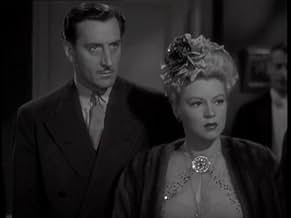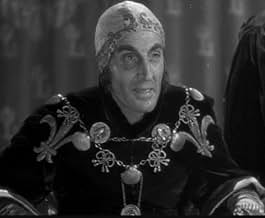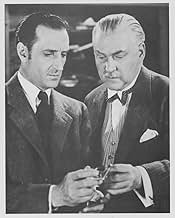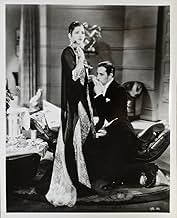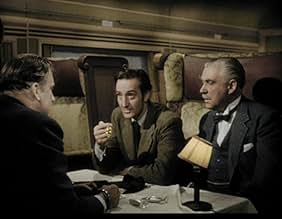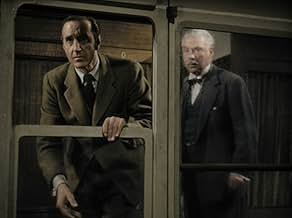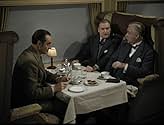Basil Rathbone(1892-1967)
- Actor
- Writer
- Additional Crew
Basil Rathbone was born in Johannesburg, South Africa, in 1892, but
three years later his family was forced to flee the country because his
father was accused by the Boers of being a British spy at a time when
Dutch-British conflicts were leading to the Boer War. The Rathbones
escaped to England, where Basil and his two younger siblings, Beatrice
and John, were raised. Their mother, Anna Barbara (George), was a
violinist, who was born in Grahamstown, South Africa, of British
parents, and their father, Edgar Philip Rathbone, was a mining engineer
born in Liverpool. From 1906 to 1910 Rathbone attended Repton School,
where he was more interested in sports--especially fencing, at which he
excelled--than studies, but where he also discovered his interest in
the theater. After graduation he planned to pursue acting as a
profession, but his father disapproved and suggested that his son try
working in business for a year, hoping he would forget about acting.
Rathbone accepted his father's suggestion and worked as a clerk for an
insurance company--for exactly one year. Then he contacted his cousin
Frank Benson, an actor managing a Shakespearean troupe in
Stratford-on-Avon.
Rathbone was hired as an actor on the condition that he work his way through the ranks, which he did quite rapidly. Starting in bit parts in 1911, he was playing juvenile leads within two years. In 1915 his career was interrupted by the First World War. During his military service, as a second lieutenant in the Liverpool Scottish 2nd Battalion, he worked in intelligence and received the Military Cross for bravery. In 1919, released from military service, he returned to Stratford-on-Avon and continued with Shakespeare but after a year moved onto the London stage. The year after that he made his first appearance on Broadway and his film debut in the silent Innocent (1921).
For the remainder of the decade Rathbone alternated between the London and New York stages and occasional appearances in films. In 1929 he co-wrote and starred as the title character in a short-running Broadway play called "Judas". Soon afterwards he abandoned his first love, the theater, for a film career. During the 1920s his roles had evolved from the romantic lead to the suave lady-killer to the sinister villain (usually wielding a sword), and Hollywood put him to good use during the 1930s in numerous costume romps, including Captain Blood (1935), The Personal History, Adventures, Experience, & Observation of David Copperfield the Younger (1935), A Tale of Two Cities (1935), Anna Karenina (1935), The Last Days of Pompeii (1935), The Adventures of Robin Hood (1938), Tower of London (1939), The Mark of Zorro (1940) and others. Rathbone earned two Oscar nominations for Best Supporting Actor as Tybalt in Romeo and Juliet (1936) and as King Louis XI in If I Were King (1938).
However, it was in 1939 that Rathbone played his best-known and most popular character, Sherlock Holmes, with Nigel Bruce as Dr. Watson, first in The Hound of the Baskervilles (1939) and then in The Adventures of Sherlock Holmes (1939), which were followed by 12 more films and numerous radio broadcasts over the next seven years.
Feeling that his identification with the character was killing his film career, Rathbone went back to New York and the stage in 1946. The next year he won a Tony Award for his portrayal of Dr. Sloper in the Broadway play "The Heiress," but afterwards found little rewarding stage work. Nevertheless, during the last two decades of his life, Rathbone was a very busy actor, appearing on numerous television shows, primarily drama, variety and game shows; in occasional films, such as Casanova's Big Night (1954), The Court Jester (1955), Tales of Terror (1962) and The Comedy of Terrors (1963); and in his own one-man show, "An Evening with Basil Rathbone", with which he toured the U.S.
Rathbone was hired as an actor on the condition that he work his way through the ranks, which he did quite rapidly. Starting in bit parts in 1911, he was playing juvenile leads within two years. In 1915 his career was interrupted by the First World War. During his military service, as a second lieutenant in the Liverpool Scottish 2nd Battalion, he worked in intelligence and received the Military Cross for bravery. In 1919, released from military service, he returned to Stratford-on-Avon and continued with Shakespeare but after a year moved onto the London stage. The year after that he made his first appearance on Broadway and his film debut in the silent Innocent (1921).
For the remainder of the decade Rathbone alternated between the London and New York stages and occasional appearances in films. In 1929 he co-wrote and starred as the title character in a short-running Broadway play called "Judas". Soon afterwards he abandoned his first love, the theater, for a film career. During the 1920s his roles had evolved from the romantic lead to the suave lady-killer to the sinister villain (usually wielding a sword), and Hollywood put him to good use during the 1930s in numerous costume romps, including Captain Blood (1935), The Personal History, Adventures, Experience, & Observation of David Copperfield the Younger (1935), A Tale of Two Cities (1935), Anna Karenina (1935), The Last Days of Pompeii (1935), The Adventures of Robin Hood (1938), Tower of London (1939), The Mark of Zorro (1940) and others. Rathbone earned two Oscar nominations for Best Supporting Actor as Tybalt in Romeo and Juliet (1936) and as King Louis XI in If I Were King (1938).
However, it was in 1939 that Rathbone played his best-known and most popular character, Sherlock Holmes, with Nigel Bruce as Dr. Watson, first in The Hound of the Baskervilles (1939) and then in The Adventures of Sherlock Holmes (1939), which were followed by 12 more films and numerous radio broadcasts over the next seven years.
Feeling that his identification with the character was killing his film career, Rathbone went back to New York and the stage in 1946. The next year he won a Tony Award for his portrayal of Dr. Sloper in the Broadway play "The Heiress," but afterwards found little rewarding stage work. Nevertheless, during the last two decades of his life, Rathbone was a very busy actor, appearing on numerous television shows, primarily drama, variety and game shows; in occasional films, such as Casanova's Big Night (1954), The Court Jester (1955), Tales of Terror (1962) and The Comedy of Terrors (1963); and in his own one-man show, "An Evening with Basil Rathbone", with which he toured the U.S.


